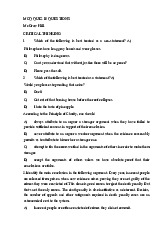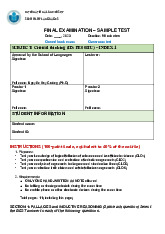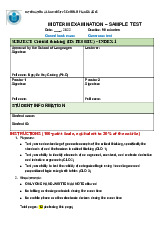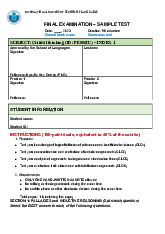




































Preview text:
How many legs does this elephant have? 2 Is it moving? 3 Fallacies 1. Fallacies What of Relevance mistake!!! 2. Fallacies of Insufficient Evidence 4 What is a Fallacy?
z A (logical) fallacy is an argument that contains a mistake in reasoning.
z Fallacies can be divided into two general types: z Fallacies of Relevance
Arguments in which the premises are logically irrelevant to the conclusion.
z Fallacies of Insufficient Evidence
Arguments in which the premises, though
logically relevant to the conclusion, fail to
provide sufficient evidence for the conclusion. 5
A statement is RELEVANT to another
statement if it provides at least some
reason for thinking that the second statement is true or false. Fallacies of Relevance
z There are three ways in which a statement can be
relevant or irrelevant to another:
1. A statement is positively relevant to another
statement if it provides at least some reasons for
thinking that the second statement is true. z Example:
- Dogs are cats. Cats are felines. So dogs are felines.
- All dogs have five legs. Rover is a dog. So Rover has five legs. 7 Fallacies of Relevance
2. A statement is negatively relevant to another
statement if it provides at least some reasons for
thinking that the second statement is false. z Example:
- John is a high-school senior. So, John likely has a Ph.D.
- Mai is two years old. So, Mai probably goes to college. 8 Fallacies of Relevance
3. A statement is logically irrelevant to another
statement if it provides no reason for thinking that the
second statement is either true or false. z Example:
- The earth revolves around the sun. Therefore,
marijuana (one type of drugs) should be legalized.
- Last night I dreamed that the Vietnamese Football
team win the World Cup. Therefore, the Vietnamese
Footbal team wil win the World Cup. 9 Fallacies of relevance z Do exercise 5.1 in page 121. z Exclude examples. z Write answers in paper and submit as homework. Date: Group: … Homework: 5.1 Answer: 2. … 3… 5… … 10 Fallacies of Relevance
z A fallacy of relevance occurs when an arguer offers
reasons that are logically irrelevant to his or her conclusion.
z Eleven Fallacies of Relevance: 1. Personal Attack 7. Bandwagon 2. Attacking the Motive Argument 3. Look Who’s Talking 8. Straw Man 4. Two Wrongs Make a Right 9. Red Herring 5. Scare Tactics 10. Equivocation 6. Appeal to Pity 11. Begging the Question 11 1. Personal Attack Personal Attack (Ad Hominem)
When an arguer rejects a person’s argument
or claim by attacking the person’s character
rather than examining the worth of the argument or claim itself. 1. X is a bad person.
2. Therefore X's argument must be bad. Pattern 12 1. Personal Attack - Examples 13 1. Personal Attack z
Not every personal attack is a fallacy Example:
Mai has testified that she saw my client rob the Bank. But
Ms. Mai has twice been convicted of perjury. In addition,
you’ve heard Ms. Mai’s own mother testify that she is a
pathological liar. Therefore, you should not believe Ms.
Mai’s testimony against my client. z
The fallacy of personal attack occurs only if:
(1) An arguer rejects another person’s argument or claim
(2) The arguer attacks the person who offers the
arguments or claim, rather than considering the 14
merits of that argument or claim. 2. Attacking the Motive Attacking the Motive
When an arguer criticizes a person’s motivation
for offering a particular argument or claim,
rather than examining the worth of the argument or claim itself.
1. X has biased or has questionable motives.
2. Therefore, X’s arguments or claim should be rejected. Pattern 15 2. Attacking the Motive - Examples
z Professor A has argued in favor of academic
tenure. But why should we even listen to Prof. A?
As a tenured professor, of course he supports tenure. 16 2. Attacking the Motive z
Not all attacks on arguer’s motives are fallacious Example:
z Burton Wexler, spokesperson for the American Tobacco
Growers Association, has argued that there is no credible
scientific evidence that cigarette smoking causes cancer.
Given Wexler’s obvious bias in the matter, his
arguments should be taken with a grain of salt. 17 3. Look Who’s Talking
Look Who’s Talking (tu quoque – And you, too)
When an arguer rejects another person’s argument
or claim because that person is a hypocrite. z Example:
My Dad’s always telling me not to talk on my mobile
phone while I’m driving, but why should I take any
notice of him? He’s always taking calls when he’s driving.
1. X fails to follow his or her own advice. Pattern 18 2. Therefore, X s
’ claim or argument should be rejected. 3. Look Who’s Talking
z It should be noted, however, that there is nothing
fallacious as such in criticizing a person’s hypocritical behavior. Example:
z Jim: Our neighbor Joe gave me a hard time again
yesterday about washing our car during this drought emergency.
Patty: Well, he’s right. But I wish that hypocrite
would live up to his own advice. Just last week I saw
him watering his lawn in the middle of the afternoon. 19 4. Two Wrongs Make a Right Two Wrongs Make a Right
When an arguer attempts to justify
a wrongful act by claiming that some other act is just as bad or worse. z Examples:
“I don’t feel guilty about cheating on Prof. A’s online quiz.
Half the class cheats on his quiz.”
“Why pick on me, officer? Everyone else is using drugs.”
1. Others are committing worse or equally bad acts. Pattern 20
2. Therefore my wrongful act is justified.




